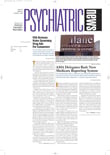African-American women are especially vulnerable to depression due to a convergence of societal and biological factors such as stress related to racial discrimination and high prevalence rates of health problems such as hypertension and cardiovascular disease.
Depression screening and prevention programs must take into account these and additional factors in order to be successful, according to Annelle Primm, M.D., M.P.H., who spoke at the APA Institute on Psychiatric Services in San Diego in October.
Primm, director of APA's Office of Minority and National Affairs, noted that several studies have found a higher rate of depressive symptoms and psychological distress among African-American and Latino women, compared with white women. The higher prevalence rates remained after controlling for socioeconomic status, she added.
Some of the risk factors for depression in women, such as low socioeconomic status and educational attainment, single marital status, and being a working mother, are more prevalent among African-American women than among white women.
Primm pointed out that development of depression is affected by chronic stress and the “subsequent immuno-regulatory effects associated with living as a member of a marginalized racial and gender group.”
Social forces such as racism and sexism “impose continuous psychological stress and increase the likelihood of developing physical and mental illnesses,” she noted.
Obesity may also contribute to an increased risk for developing depression in African-American women, Primm pointed out. “There is a negative association between obesity and mental well-being,” she said.
African-American women have a greater prevalence of obesity (37.7 percent) when compared with white women (23.5 percent), she said, and overeating may begin as a strategy to cope with sexual abuse, racism, classism, and poverty in African-American women.
Primm cited the 2001 report of former Surgeon General David Satcher, M.D.,“ Mental Health: Culture, Race, and Ethnicity,” which brought to light the problems many minority groups have in accessing mental health services.
“On top of that,” she said, “we know that people of color who are able to access services are less likely to receive quality mental health care,” which can be partially attributed to a lack of culturally and linguistically competent mental health care clinicians.
On a broad level, policies that target poverty reduction would“ greatly benefit mental health outcomes” for African-American women.
More specifically, successful depression-prevention campaigns should incorporate “resiliency factors” employed by many African-American women, such as spirituality, which may help some to cope with depressive symptoms.
Preventive strategies should also incorporate nutrition and exercise, Primm noted.
She also recommended that depression screening be implemented to a greater extent at prenatal clinics located in public health facilities, welfare programs, and vocational-assistance programs.
In addition, it is crucial that screening programs link women who show depression symptoms to culturally competent treatment services in their community.
“What is good for African-American women in terms of preventing depression is good for all women in general and for the whole country,” Primm declared. ▪

